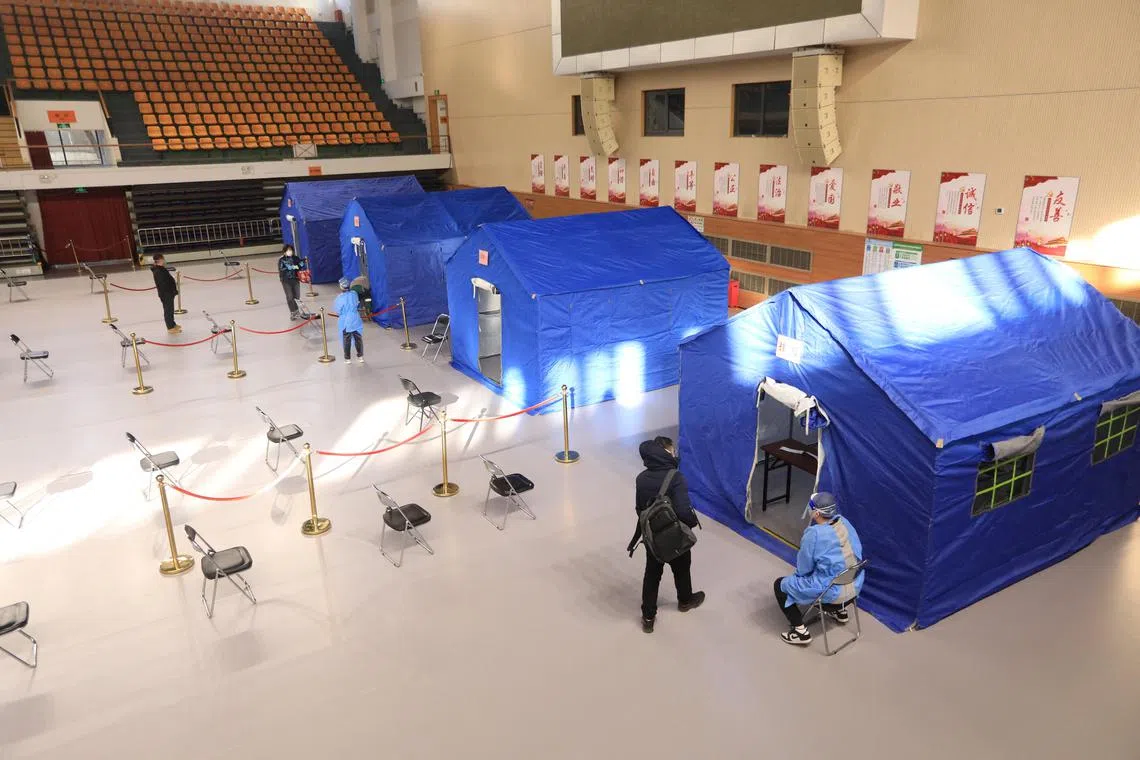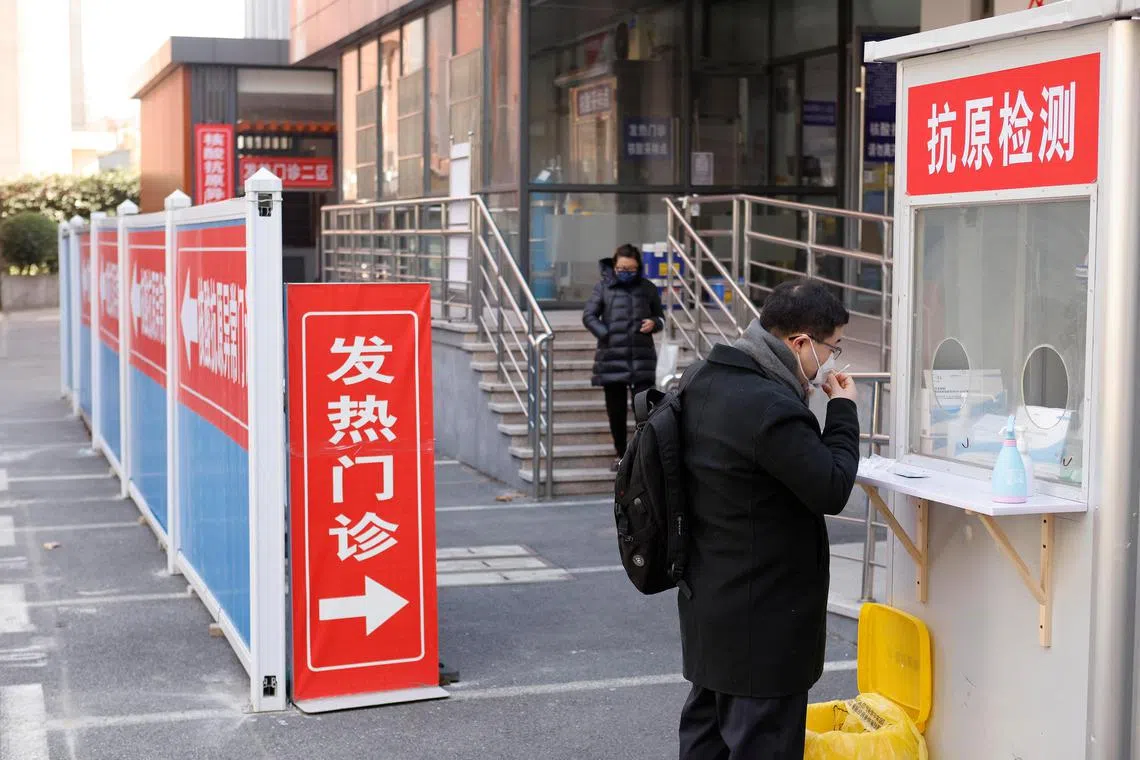China braces itself for Covid-19 spread to countryside as holidays near
Sign up now: Get insights on Asia's fast-moving developments

People lining up at a makeshift fever clinic set up inside a stadium in Beijing, on Dec 14, 2022. China reported 2,157 new symptomatic Covid-19 infections for Dec 15.
PHOTO: REUTERS
BEIJING/SHANGHAI - China set out urgent plans to protect rural communities from Covid-19 on Friday as millions of city dwellers planned holidays for the first time in years after Beijing abandoned its stringent system of lockdowns and travel curbs.
China’s move last week to start aligning itself with a world that has largely opened up to live with the virus followed historic protests against President Xi Jinping’s signature zero-Covid policies designed to stamp out the pandemic.
But the excitement that met this dramatic U-turn has quickly given way to concerns that China is unprepared for the wave of infections and the blow it could deliver to the world’s second-largest economy.
China reported 2,157 new symptomatic Covid-19 infections for Thursday, queues outside fever clinics
Financial magazine Caixin reported that two former Chinese state media journalists have died in the capital Beijing in recent days due to Covid-19, among the first reported fatalities since most epidemic control policies were removed on Dec 7.
Former People’s Daily reporter Yang Lianghua, 74, died on Thursday, while former China Youth Daily editor Zhou Zhichun, 77, died on Dec 8, according to Caixin.
China’s national health authority has not reported any official Covid-19 deaths since Dec 7. The last official deaths were reported on Dec 3 in Shandong and Sichuan provinces.
There is particular concern about China’s hinterland in the run-up to the Chinese New Year holiday starting on Jan 22.
Rural areas are likely to be inundated with travellers returning to their home towns and villages, which have had little exposure to the virus during the three years since the pandemic erupted.
China’s National Health Commission on Friday said it was ramping up vaccinations and building stocks of ventilators, essential drugs and test kits in rural areas. It also advised travellers to reduce contact with elderly relatives.
A day after the White House said the US was ready to help if China requested it, a spokesman for Australia’s Department of Foreign Affairs and Trade said on Friday that Australia stands ready to continue Covid-19 collaboration that has so far included the supply of medical equipment and joint research work.
Chinese Foreign Ministry spokesman Wang Wenbin did not respond directly to questions about the US offer but said on Thursday that China had institutional advantages to fight Covid-19.
China’s international borders remain largely shut, but recent decisions to abandon testing prior to domestic travel and disable apps that tracked people’s journey history have freed up people to move around the country.
One of China’s most populous provinces, Henan, cancelled all holidays for healthcare staff until the end of March to ensure “a smooth transition” as Covid-19 restrictions ease, state media reported on Thursday.
Multiple cities across the country of 1.4 billion people also opened new vaccination sites to encourage the public to take booster shots, the state-run Global Times newspaper reported.
Hong Kong said on Friday its adult residents could get a fifth shot, with infections there on the up in recent months.
“Go all out” was the message from China’s state asset regulator in a statement on Thursday that urged government-owned drugmakers to ensure adequate supplies of Covid-19-related medicines to meet the rapid increase in demand.

A man taking a Covid-19 test outside the fever clinic of a hospital in Shanghai on Dec 15, 2022.
PHOTO: REUTERS
Thanks to the government’s previously uncompromising controls, China got off lightly compared with many other countries during the pandemic over the past three years, but many Chinese are now resigned to catching the virus at some point.
“Everyone will get it, I guess,” a 29-year-old Beijing resident who requested to be identified by her surname Du, told Reuters on the streets of Beijing.
Analysts fear China will pay a price for letting the virus rapidly rip through a population that lacks herd immunity and has low vaccination rates among the elderly.
That has dented the prospects for any near-term rebound in growth, even if the opening-up should eventually revive the country’s economy.
JP Morgan on Friday revised downwards its expectations for China’s 2022 growth to 2.8 per cent, which is well below the country’s official target of 5.5 per cent and would mark one of China’s worst performances in almost half a century.
China is bracing itself for a “transitional pain period”, analysts at the bank said, adding that they expect infections to spike in the months after the Chinese New Year holiday, before the economy starts to recover in the middle of 2023.
China will implement a proactive fiscal policy and a prudent monetary policy next year, said a statement issued after the annual Central Economic Work Conference, which has been watched closely by investors amid expectations that Beijing would ramp up support measures.
Fiscal policy will be stepped up and become more efficient, maintaining the necessary intensity of spending, while monetary policy will be precise and forceful, keeping liquidity reasonably ample, the official Xinhua news agency reported, citing the statement issued on Friday following the agenda-setting meeting of leaders and policymakers. REUTERS


